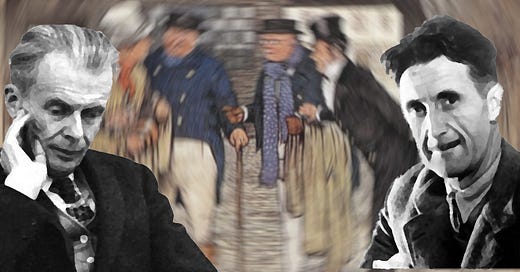Pickwickian Democracy
Aldous Huxley, George Orwell, and the argument over which kind of dystopia was rushing towards us out of the future
“Democracy and freedom will be the theme of every broadcast and editorial - but democracy and freedom in a strictly Pickwickian sense. Meanwhile the ruling oligarchy and its highly trained elite of soldiers, policemen, thought-manufacturers and mind-manipulators will quietly run the show as they see fit.” - Aldous Huxley, 1958
In 1949, shortly after the publication of his novel Nineteen Eighty-Four, George Orwell received a letter from his old French teacher at the English boarding school Eton. His former tutor praised his student’s book, calling it “profoundly important”. He also raised a point of criticism: that the policy of ‘boot-on-the-face’ (Orwell’s metaphor for the totalitarianism he depicts) could not go on indefinitely. His teacher wrote that “the ruling oligarchy” would find more efficient ways of “satisfying its lust for power”. The letter was written by Aldous Huxley, who had taught Orwell in 1931, and wrote Brave New World the following year.
Huxley later collected his thoughts about the relationship between the two great British dystopias in a 1958 essay entitled Brave New World Revisited. It makes for fascinating reading, and its striking insights apply rather too well to the situation facing us today. Huxley saw two concerns coming in the latter half of the twentieth century that were going to bend the shape of democratic norms: overpopulation and ‘over-organization’. To a fair extent, Huxley’s concerns about overpopulation do not seem to have been entirely borne out, despite this being a recurrent fear throughout the latter half of the twentieth century. But his fears about the manipulation of the systems of governance have most certainly come to pass.
The core of Huxley’s concern was that those with the necessary means (the wealthy and the well-positioned) could gradually tweak the nature of the democratic institutions to their benefit. The key elements of democracy (“the quaint old forms”) would remain in place - elections, assemblies, Supreme Courts and so forth. But behind their operation would lie a “new kind of non-violent totalitarianism”. As the opening quote makes clear, while democracy and freedom would be proclaimed throughout public media, the form of government would be what Huxley calls “democracy and freedom in a strictly Pickwickian sense”. This is a reference to Charles Dickens’ first novel, The Pickwick Papers, in which a gentleman’s society bickers amongst itself while in session, while dismissing all insults as being meant solely ‘in a Pickwickian sense’ i.e. not literally meant, just for show. For most of us, Huxley’s Pickwickian Democracy is our current form of government.
The core of the problem as Huxley saw it was that “the bureaucrats of Big Government and Big Business” would take upon more and more of the management of the national affairs. He did not suggest how this would come about (namely through the evocation of perpetual emergency), but he could see that there was a ratchet here that can crank in only one direction. Looking from Britain to the US in 1958, Huxley found great cause for alarm, seeing the States as further down the line towards Pickwickian Democracy. Huxley specifically mentioned an opinion poll suggesting that the majority of teens at that time had no faith in their democratic institutions, saw no objection to censoring unpopular ideas, and was willing to be ruled by “an oligarchy of assorted experts”.
But this was 1958. I would suggest that the 1960s saw this situation overturned, both by the ultimately doomed utopianism of the Hippies and - more significantly - by the organised resistance and ethical clarity of the Civil Rights movement. It may have been true that the majority was at risk of accepting a mere Pickwickian Democracy in 1958 - but in the decade that followed, this risk was fought back, even if it could not be entirely prevented.
The concerns that Huxley raised regarding increasingly sophisticated methods for manipulating thought (a political process now euphemised as ‘nudging’) have returned with redoubled force in our time... Nonetheless, while we have faced the falling boot yet again and could not stop recent calamities from unfolding, we have in their wake fostered a generation unwilling to give up on the promise of freedom. Yet if we are to avoid the grim slide further into Pickwickian Democracy, it will take the co-operation of everyone to open up alternative paths for governance.






Can't imagine how you came to the conclusion: "we have in their wake fostered a generation unwilling to give up on the promise of freedom."